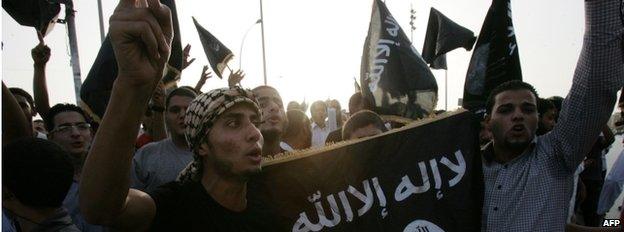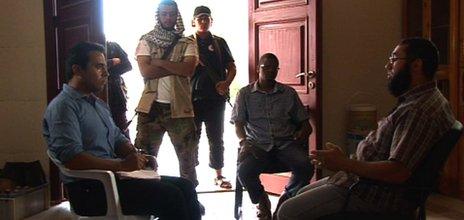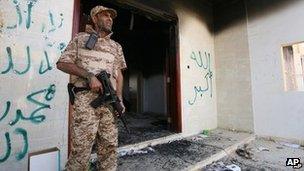Meeting Mohammad Ali al-Zahawi of Libyan Ansar al-Sharia
- Published

Mohammad Ali al-Zahawi, the commander of Libya's largest Islamist brigade, is not known among Benghazi residents as a person who wants to attract media attention.
But in recent days Ansar al-Sharia has come under the spotlight.
The death of US ambassador Christopher Stevens in a military-style attack on the US consulate in Benghazi was the latest episode of violence attributed to his brigade - though no evidence has backed such accusations.
In an unusual move, Mr Zahawi agreed to give his first interview to an international broadcaster - giving a glimpse into his ideology.
"We are a brigade not a movement," he told BBC Arabic TV at the brigade's fortified headquarters in the heartland of Libya's second largest city.
"We formed our brigade after the toppling of tyrant [Muammar] Gaddafi.
"We took part in the liberation of Libya but now they are many brigades with different ideologies."
Once the dust settled after the internecine conflict last year, many brigades have emerged across Libya.
Attempts by governing officials to encourage their commanders to disarm have almost proved futile.
Ansar al-Sharia is no exception.
"It is not the right time we give up our arms because we are in a battle with the liberals, the secularists and the remnants of Gaddafi," explained Mr Zahawi, 44, who was wearing jeans and a black checked shirt.
Nervous
The brigade's building is just minutes away from the city centre.
A group of heavily armed young men with growing beards mans the main entrance.
They were nervous about our camera. The instructions were clear: Do not show our faces and no filming inside.
Inside, our movement was restricted to one room and its attached hall where we interviewed Mr Zahawi.
The brigade is operating openly like many others since the ousting of Col Gaddafi last year.

The interview was closely watched by bodyguards and his media assistant
And they have a goal they have not achieved yet.
"Our brave youths will continue their struggle until they impose Sharia," Mr Zahawi said confidently.
The brigade has an ultra-conservative interpretation of Islam.
Mr Zahawi confirmed in the interview that his brigade had demolished and desecrated Sufi shrines in Benghazi, which they regard as idolatrous.
"It is a religious duty to remove these shrines because people worship the deceased and this is prohibited. It is not me who says so but rather our religion."
'No al-Qaeda link'
Mr Zahawi believes that the United States has an agenda.

The US consulate in Benghazi was set on fire last week, killing Ambassador Stevens
"Make no mistake, there is a massive American onslaught on Muslim countries. The crusaders want to occupy our countries and act as our guardians. They do not respect our sovereignty," he said.
His brigade was not linked to al-Qaeda though he thoroughly approves of its strategy, he said.
"Al-Qaeda's strategy is aimed at weakening US hegemony on the Muslim nation," he said.
Asked what he thinks of recent statements made by al-Qaeda leader Ayman al-Zawahiri, Mr Zahawi said: "Such statements are a wake-up call for Muslims.
"They help galvanise the Muslim nation, maintain its dignity and pride.
"Sheikh Ayman al-Zawahiri is keen on safeguarding Muslim rights."
Mr Zahawi reiterated his brigade was not behind the attack on 12 September on the US consulate in Benghazi.
But he stopped short of condemning the death of the US ambassador.
"Do you think that the killing of the US ambassador is more heinous than the several insults made about the Prophet, peace be upon him?" he asked.
The US ambassador and three other US consulate staff were killed when the consulate was set ablaze in protests over an anti-Islam film made in the US.
"I swear by God that we can tolerate the killing of all people and wiping all countries off the map but we cannot tolerate a single swear word that could hurt our prophet," he said.
"They are weeping buckets on this ambassador but they won't shed any tears when dozens of Muslims are injured in these protests against the blasphemous film."
After 40 minutes the interview - which was closely watched over by his armed guards and his media assistant - came to an end.
We had expected it to be a short meeting, but Mr Zahawi had relaxed and warmed to his subject.
He shook our hands warmly before we left, though this friendly manner did not extend to the guards who escorted us to our vehicle.